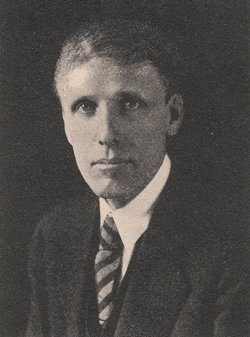Biography of Ridgely Torrence
Frederic Ridgely Torrence (November 27, 1874 – December 25, 1950) was an American poet, and editor. He received the Shelley Memorial Award in 1942 and the Academy of American Poets' Fellowship in 1947.Early life and education
Born on November 27, 1874 in Xenia, Ohio, Torrence was the eldest child of Captain David Findley Torrence and Mary Ridgely Torrence. His father was a lumber dealer. His grandfather, John Torrence, founded Xenia and Lexington, Kentucky. He had a brother, Findley McDowell Torrence, who attended Harvard University and married a hometown woman, Patricia Broadstone.He had tutors while he was growing up and attended Miami University in Oxford, Ohio from 1893 to 1895 and transferred to Princeton University. He withdrew from Princeton after he suffered an illness that prevented him from returning to school in 1896.
Career
Early career
In the late 1890s he settled in Greenwich Village, in New York City, working as a librarian at the Astor Library from 1897 to 1901, and then at Lenox Library until 1903. He was assistant editor at The Critic from 1903 to 1904. He worked for the Japanese special envoy to the United States as a secretary in 1905. He was the fiction editor at Cosmopolitan magazine, from 1905 to 1907.
Poet and playwright
During his early year in New York, he became part of a circle of poets that included E. A. Robinson, William Vaughn Moody, and Robert Frost. In 1900, he published The House of a Hundred Lights, which Edmund Clarence Stedman helped him revise.The verse plays, showing the influence of John Millington Synge, showed realistic portrayals of African Americans, and a revolt against their station in society. While his verse dramas were published as books, they were not produced as plays.In 1914, his one-act play Granny Maumee, which was first performed by a white cast, helped create opportunities for black actors in theaters in America when it was produced with black actors in 1917. It was "one of the first opportunities for serious black actors". Torrence's collection of plays, Three Plays for a Negro Theater premiered in 1917, as a production of the Negro Players. He work was noteworthy in its blending of compassion and strength.
Torrence had fellowships to MacDowell Colony, the artist colony, in 1914, 1917, and then every year from 1942 to 1950. In 1938, he was poet in residence at Antioch College and in 1941 to 1942, he was Fellow in Creative Writing at Miami University.He was poetry editor of The New Republic (1920–33), mentoring Louise Bogan. He organized the National Survey of the Negro Theater (1939), for the Rockefeller Foundation. The posthumous book Poems, of Torrence's selected poetry, was published in 1952. He chose works that reflected his values, compassion for others, sense of injustice among people, and a faith in mankind.
I trust the people as I trust the stars.And if they lose the reckoning they will find it, For they must learn and by their griefs they will,Must learn to steer themselves, steer or be steered.
Awards
1942 Shelley Memorial Award
1947 Academy of American Poets' Fellowship
Personal life
In 1914, he married author Olivia Howard Dunbar, who was a magazine writer, novelist, and reporter for the New York World. They lived at Washington Square in Lower Manhattan.Torrence died on December 25, 1950 in New York City. His papers are held at Princeton. Olivia died on January 6, 1953.
Works
Poetry
The House of a Hundred Lights. Small, Maynard. 1900.
Hesperides. The Macmillan Company. 1925.
Poems. Macmillan. 1941.
Theater
Torrence, Ridgely (1903). El Dorado: A Tragedy. John Lane.
Torrence, Ridgely (1907). Abelard and Heloise: A Drama. C. Scribner's sons.
Torrence, Ridgely (1917). Granny Maumee, The Rider of Dreams, Simon the Cyrenian: Plays for a Negro Theater. The Macmillan company.
Anthologies
Louis Untermeyer, ed. (1941). "The Bird and the Tree". Modern American Poetry.
Jessie B. Rittenhouse, ed. (1917). "The Lesser Children". The Little Book of Modern Verse.
Non-fiction
The story of John Hope. Macmillan Co. 1948.
Edwin Arlington Robinson (1940). Ridgely Torrence (ed.). Selected letters of Edwin Arlington Robinson. The Macmillan company.{{cite book}}: CS1 maint: uses authors parameter (link)
Notes
References
External links
"Ridgely Torrence." Encyclopædia Britannica. 2009. Encyclopædia Britannica Online. 19 Jun. 2009
Cary D. Wintz; Paul Finkelman, eds. (2004). Encyclopedia of the Harlem Renaissance. Taylor & Francis. ISBN 978-1-57958-458-0.
Works by or about Ridgely Torrence at Internet Archive
Ridgely Torrence at Find a Grave
Ridgely Torrence Papers at Princeton University Library Special Collections
